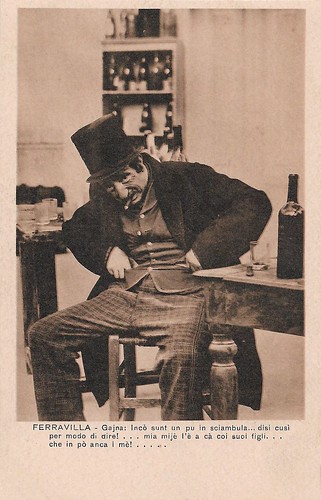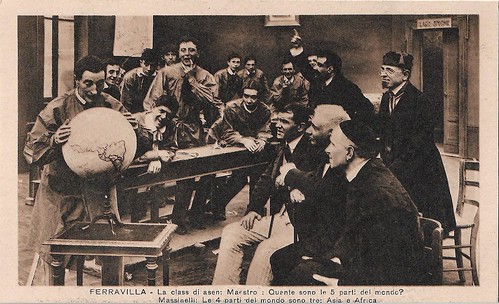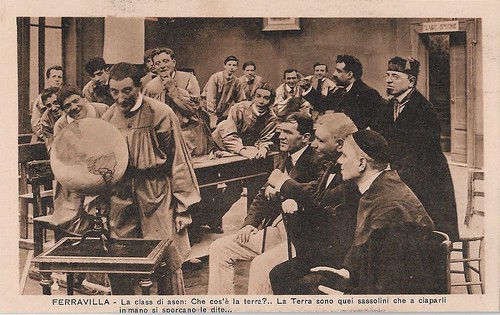Edoardo Ferravilla (1846-1915) was a comic actor and playwright of the Italian stage and silent screen. He performed in Milanese dialect and became the darling of the Italian public. Between 1913 and 1915, Ferravilla also had a short but successful film career. This post gives an impression of his characters and the films he made in 1914 for the Comerio Film Company. Just a year later the actor passed away.

Italian postcard by IPA CT Duplex, no. 5894. Photo: Comerio, Milano / V. Uff. Rev. St. Terni. Edoardo Ferravilla in Ferravilla nelle sue più caratteristiche interpretazioni/Ferravilla in his most characteristic interpretations (Arnaldo Giacomelli, 1915). Caption in Milanese dialect: Masinelli: Watch out, Crapotti, if you don't stand still, I will become a vortex. It is better to be a thief than a nosebody like you.

Italian postcard by IPA CT Duplex, no. 5895. Photo: Fot. Comerio, Milano / V. Uff. Rev. St. Terni. Edoardo Ferravilla in Ferravilla nelle sue più caratteristiche interpretazioni/Ferravilla in his most characteristic interpretations (Arnaldo Giacomelli, 1915). Caption in Milanese dialect: Gajna (the drunkard): Is it me wanting to meet the light or is it the light wanting to meet me?

Italian postcard by IPA CT Duplex, no. 5896. Photo: Comerio, Milano / V. Uff. Rev. St. Terni.Edoardo Ferravilla in Ferravilla nelle sue più caratteristiche interpretazioni/Ferravilla in his most characteristic interpretations (Arnaldo Giacomelli, 1915). Caption in Milanese dialect: Maester Pastisa: My opera will start with a funeral march, just for a change, and will consist of 16 acts and 48 choruses. Mocking Italian composers, Ferravilla here performs his character Maester Pastisa.

Italian postcard by IPA CT Duplex, no. 5897. Photo: Fot. Comerio, Milano / V. Uff. Rev. St. Terni.
Edoardo Ferravilla was born in Milano, Italy in 1846. As an actor, Ferravilla would always perform in the Milanese dialect.
The surname Ferravilla might have been the union between the initials of the mother's surname, the variety actress Luisa Maria Ferrari, and that of his natural father, Marquis Filippo Villani, so his nom de plume would be a pseudonym of Edoardo Villani.
According to the Enciclopedia Italiana, though, his mother was the Portuguese singer Giulia Ferravilla, whose surname he then adopted. An orphan of his mother at the age of six and abandoned by his father who married a dancer, he was adopted by the family of his guardian, the accountant Vigliezzi.
Discovered as an actor by Cletto Arrighi, founder of the Teatro Milanese, he acted with him from 1870 on. He made his debut in the comedy 'El Barchett de Boffalora', which would become one of the most important in his repertoire. He would stage it hundreds of times.
He soon became the darling of the Italian public. Even opera composer Giuseppe Verdi and Queen Margherita were among his fans. This success allowed him to take the artistic direction of the theatre company in 1876. During the second half of the nineteenth century, he was active in various theatre companies

Italian postcard by IPA CT Duplex, no. 5898. Photo: Fot. Comerio, Milano / V. Uff. Rev. St. Terni. Caption in Milanese dialect: Gajna (the drunkard): Wait...Waiter!... Bring me a bottle of petrol! ...Ah, well! ciao! Here Ferravilla performs his character Tecoppa.

Italian postcard by IPA CT Duplex, no. 5899. Photo: Comerio, Milano / V. Uff. Rev. St. Terni. Edoardo Ferravilla in Tecoppa & c. (1914). Caption in Milanese dialect: Gajna, I am a bit in shambles, so to say! My wife is at home with her children, which are a bit also mine! Here Ferravilla performs his character Tecoppa.

Italian postcard by IPA CT Duplex, no. 5900. Photo: Fot. Comerio, Milano / V. Uff. Rev. St. Terni. Caption [in Milanese dialect]: The songwriter: Ah! Virginia, my love! You are the star of my love! Here Ferravilla performs his character Gigione.

Italian postcard by IPA CT Duplex, no. 5901. Photo: Fot. Comerio, Milano / V. Uff. Rev. St. Terni. Ferravilla in Massinelli in vacanza (Arnaldo Giacomelli, 1914). Caption: Massinelli sings a romantic song, while grimly glaring at a young man sitting next to his fiancee, and when he has finished singing, he will sit down next to him and her, even if there is no place anymore on the sofa.
In 1900, Edoardo Ferravilla published his memoir Edoardo Ferravilla parla della sua vita, della sua arte, del suo teatro (Edoardo Ferravilla talks about his Life, his Art, and his Theatre). From 1902 on, he alternated his appearances on the scene with longer and longer periods of rest.
During his career, Ferravilla wrote some 22 comedies, vaudeville acts, farces and parodies, often reworkings of existing farces by other actors. Ferravilla was legendary for the naturalness with which he interpreted comedies in the vernacular language. He created a series of very important characters within the imagination of the Milanese public of the late nineteenth century: Massinelli, El sciur Pànera, Gigione, Master Pastizza, and Tecoppa.
He also performed these characters in the cinema. On the eve of World War I, he performed in several comical and theatrical short films, shot between 1913 and 1915. He thus immortalised some of his most popular sketches and linked the early cinema to the repertoire of an ancient stage tradition. First, he worked at Mediolanum Film and then at Comerio Films, the company of Luca Comerio. Actor Piero Mazzarella considered him his artistic father, and in some comedies, he also recreated his characters, including the aforementioned Tecoppa.
The Cineteca Italiana in Milan recently restored 5 film sketches with Ferravilla and released them on DVD: Tecoppa e gli altri personaggi di Edoardo Ferravilla. The related film titles are: Ferravilla nelle sue più caratteristiche interpretazioni/Ferravilla in his most characteristic interpretations, Tecoppa & c., La class di asen/The class of asses, Massinelli in vacanza/Massinelli on vacation, and Ferravilla al trucco, all dating from 1914. Apart from Tecoppa & c., all films were directed by Arnaldo Giacomelli.
At the Paolo Grassi Library in Milan, a sound fragment with Ferravilla's voice was discovered which matched with one of the films restored by the Cineteca Italiana, Scena a soggetto musicale (Arnaldo Giacomelli, 1915), in which he appeared with his wife Maria Ferravilla. It is an exceptional testimony of how 'experimental' cinema was already existing in 1915! In the autumn of 1915, Edoardo Ferravilla passed away in his beloved hometown Milan.

Italian postcard by IPA CT Duplex, no. 5902. Photo: Fot. Comerio, Milano / V. Uff. Rev. St. Terni. Ferravilla in La class di asen (Arnaldo Giacomelli, 1914). La class di asen is Milanese dialect for La classe degli asini (The class of the asses). Caption: Teacher: What are the five continents of the world? Massinelli: The four contents of the world are three: Asia and Africa.

Italian postcard by IPA CT Duplex, no. 5903. Fot. Comerio, Milano / V. Uff. Rev. St. Terni. The card refers probably to La class di asen (Arnaldo Giacomelli, 1914), starring Ferravilla. Caption: Ferravilla as soldier - One two... One two!... Yes, let's go to war! To war, we'll go!

Italian postcard by IPA CT Duplex, no. 5904. Photo: Fot. Comerio, Milano / V. Uff. Rev. St. Terni. Postcard for the film La class di asen (Arnaldo Giacomelli, 1914). Caption: What is earth? Earth are those little stones that dirt your fingers when you pick them up.

Italian postcard by IPA CT Duplex, no. 5905. Photo: Fot. Comerio, Milano / V. Uff. Rev. St. Terni. Ferravilla in La class di asen (Arnaldo Giacomelli, 1914). La class di asen is Milanese dialect for La classe degli asini (The class of the asses). Caption partly in Milanese dialect: The story of the excursion. One day it was party time, the sky had taken the colour of blotting paper, and then the rain came pouring down. All the farmers grouped around the cart with the marenata (marenata is a typical dessert made with amarene/ black cherries).
Sources: Cineteca Milano (Italian), Enciclopedia Treccani (Italian), Wikipedia (Italian) and IMDb.
With special thanks to Marcello Seregni for helping us to translate the captions. This post was last updated on 10 March 2024.

Italian postcard by IPA CT Duplex, no. 5894. Photo: Comerio, Milano / V. Uff. Rev. St. Terni. Edoardo Ferravilla in Ferravilla nelle sue più caratteristiche interpretazioni/Ferravilla in his most characteristic interpretations (Arnaldo Giacomelli, 1915). Caption in Milanese dialect: Masinelli: Watch out, Crapotti, if you don't stand still, I will become a vortex. It is better to be a thief than a nosebody like you.

Italian postcard by IPA CT Duplex, no. 5895. Photo: Fot. Comerio, Milano / V. Uff. Rev. St. Terni. Edoardo Ferravilla in Ferravilla nelle sue più caratteristiche interpretazioni/Ferravilla in his most characteristic interpretations (Arnaldo Giacomelli, 1915). Caption in Milanese dialect: Gajna (the drunkard): Is it me wanting to meet the light or is it the light wanting to meet me?

Italian postcard by IPA CT Duplex, no. 5896. Photo: Comerio, Milano / V. Uff. Rev. St. Terni.Edoardo Ferravilla in Ferravilla nelle sue più caratteristiche interpretazioni/Ferravilla in his most characteristic interpretations (Arnaldo Giacomelli, 1915). Caption in Milanese dialect: Maester Pastisa: My opera will start with a funeral march, just for a change, and will consist of 16 acts and 48 choruses. Mocking Italian composers, Ferravilla here performs his character Maester Pastisa.

Italian postcard by IPA CT Duplex, no. 5897. Photo: Fot. Comerio, Milano / V. Uff. Rev. St. Terni.
Verdi and Queen Margherita among his fans
Edoardo Ferravilla was born in Milano, Italy in 1846. As an actor, Ferravilla would always perform in the Milanese dialect.
The surname Ferravilla might have been the union between the initials of the mother's surname, the variety actress Luisa Maria Ferrari, and that of his natural father, Marquis Filippo Villani, so his nom de plume would be a pseudonym of Edoardo Villani.
According to the Enciclopedia Italiana, though, his mother was the Portuguese singer Giulia Ferravilla, whose surname he then adopted. An orphan of his mother at the age of six and abandoned by his father who married a dancer, he was adopted by the family of his guardian, the accountant Vigliezzi.
Discovered as an actor by Cletto Arrighi, founder of the Teatro Milanese, he acted with him from 1870 on. He made his debut in the comedy 'El Barchett de Boffalora', which would become one of the most important in his repertoire. He would stage it hundreds of times.
He soon became the darling of the Italian public. Even opera composer Giuseppe Verdi and Queen Margherita were among his fans. This success allowed him to take the artistic direction of the theatre company in 1876. During the second half of the nineteenth century, he was active in various theatre companies

Italian postcard by IPA CT Duplex, no. 5898. Photo: Fot. Comerio, Milano / V. Uff. Rev. St. Terni. Caption in Milanese dialect: Gajna (the drunkard): Wait...Waiter!... Bring me a bottle of petrol! ...Ah, well! ciao! Here Ferravilla performs his character Tecoppa.

Italian postcard by IPA CT Duplex, no. 5899. Photo: Comerio, Milano / V. Uff. Rev. St. Terni. Edoardo Ferravilla in Tecoppa & c. (1914). Caption in Milanese dialect: Gajna, I am a bit in shambles, so to say! My wife is at home with her children, which are a bit also mine! Here Ferravilla performs his character Tecoppa.

Italian postcard by IPA CT Duplex, no. 5900. Photo: Fot. Comerio, Milano / V. Uff. Rev. St. Terni. Caption [in Milanese dialect]: The songwriter: Ah! Virginia, my love! You are the star of my love! Here Ferravilla performs his character Gigione.

Italian postcard by IPA CT Duplex, no. 5901. Photo: Fot. Comerio, Milano / V. Uff. Rev. St. Terni. Ferravilla in Massinelli in vacanza (Arnaldo Giacomelli, 1914). Caption: Massinelli sings a romantic song, while grimly glaring at a young man sitting next to his fiancee, and when he has finished singing, he will sit down next to him and her, even if there is no place anymore on the sofa.
Legendary for his naturalness
In 1900, Edoardo Ferravilla published his memoir Edoardo Ferravilla parla della sua vita, della sua arte, del suo teatro (Edoardo Ferravilla talks about his Life, his Art, and his Theatre). From 1902 on, he alternated his appearances on the scene with longer and longer periods of rest.
During his career, Ferravilla wrote some 22 comedies, vaudeville acts, farces and parodies, often reworkings of existing farces by other actors. Ferravilla was legendary for the naturalness with which he interpreted comedies in the vernacular language. He created a series of very important characters within the imagination of the Milanese public of the late nineteenth century: Massinelli, El sciur Pànera, Gigione, Master Pastizza, and Tecoppa.
He also performed these characters in the cinema. On the eve of World War I, he performed in several comical and theatrical short films, shot between 1913 and 1915. He thus immortalised some of his most popular sketches and linked the early cinema to the repertoire of an ancient stage tradition. First, he worked at Mediolanum Film and then at Comerio Films, the company of Luca Comerio. Actor Piero Mazzarella considered him his artistic father, and in some comedies, he also recreated his characters, including the aforementioned Tecoppa.
The Cineteca Italiana in Milan recently restored 5 film sketches with Ferravilla and released them on DVD: Tecoppa e gli altri personaggi di Edoardo Ferravilla. The related film titles are: Ferravilla nelle sue più caratteristiche interpretazioni/Ferravilla in his most characteristic interpretations, Tecoppa & c., La class di asen/The class of asses, Massinelli in vacanza/Massinelli on vacation, and Ferravilla al trucco, all dating from 1914. Apart from Tecoppa & c., all films were directed by Arnaldo Giacomelli.
At the Paolo Grassi Library in Milan, a sound fragment with Ferravilla's voice was discovered which matched with one of the films restored by the Cineteca Italiana, Scena a soggetto musicale (Arnaldo Giacomelli, 1915), in which he appeared with his wife Maria Ferravilla. It is an exceptional testimony of how 'experimental' cinema was already existing in 1915! In the autumn of 1915, Edoardo Ferravilla passed away in his beloved hometown Milan.

Italian postcard by IPA CT Duplex, no. 5902. Photo: Fot. Comerio, Milano / V. Uff. Rev. St. Terni. Ferravilla in La class di asen (Arnaldo Giacomelli, 1914). La class di asen is Milanese dialect for La classe degli asini (The class of the asses). Caption: Teacher: What are the five continents of the world? Massinelli: The four contents of the world are three: Asia and Africa.

Italian postcard by IPA CT Duplex, no. 5903. Fot. Comerio, Milano / V. Uff. Rev. St. Terni. The card refers probably to La class di asen (Arnaldo Giacomelli, 1914), starring Ferravilla. Caption: Ferravilla as soldier - One two... One two!... Yes, let's go to war! To war, we'll go!

Italian postcard by IPA CT Duplex, no. 5904. Photo: Fot. Comerio, Milano / V. Uff. Rev. St. Terni. Postcard for the film La class di asen (Arnaldo Giacomelli, 1914). Caption: What is earth? Earth are those little stones that dirt your fingers when you pick them up.

Italian postcard by IPA CT Duplex, no. 5905. Photo: Fot. Comerio, Milano / V. Uff. Rev. St. Terni. Ferravilla in La class di asen (Arnaldo Giacomelli, 1914). La class di asen is Milanese dialect for La classe degli asini (The class of the asses). Caption partly in Milanese dialect: The story of the excursion. One day it was party time, the sky had taken the colour of blotting paper, and then the rain came pouring down. All the farmers grouped around the cart with the marenata (marenata is a typical dessert made with amarene/ black cherries).
Sources: Cineteca Milano (Italian), Enciclopedia Treccani (Italian), Wikipedia (Italian) and IMDb.
With special thanks to Marcello Seregni for helping us to translate the captions. This post was last updated on 10 March 2024.
No comments:
Post a Comment